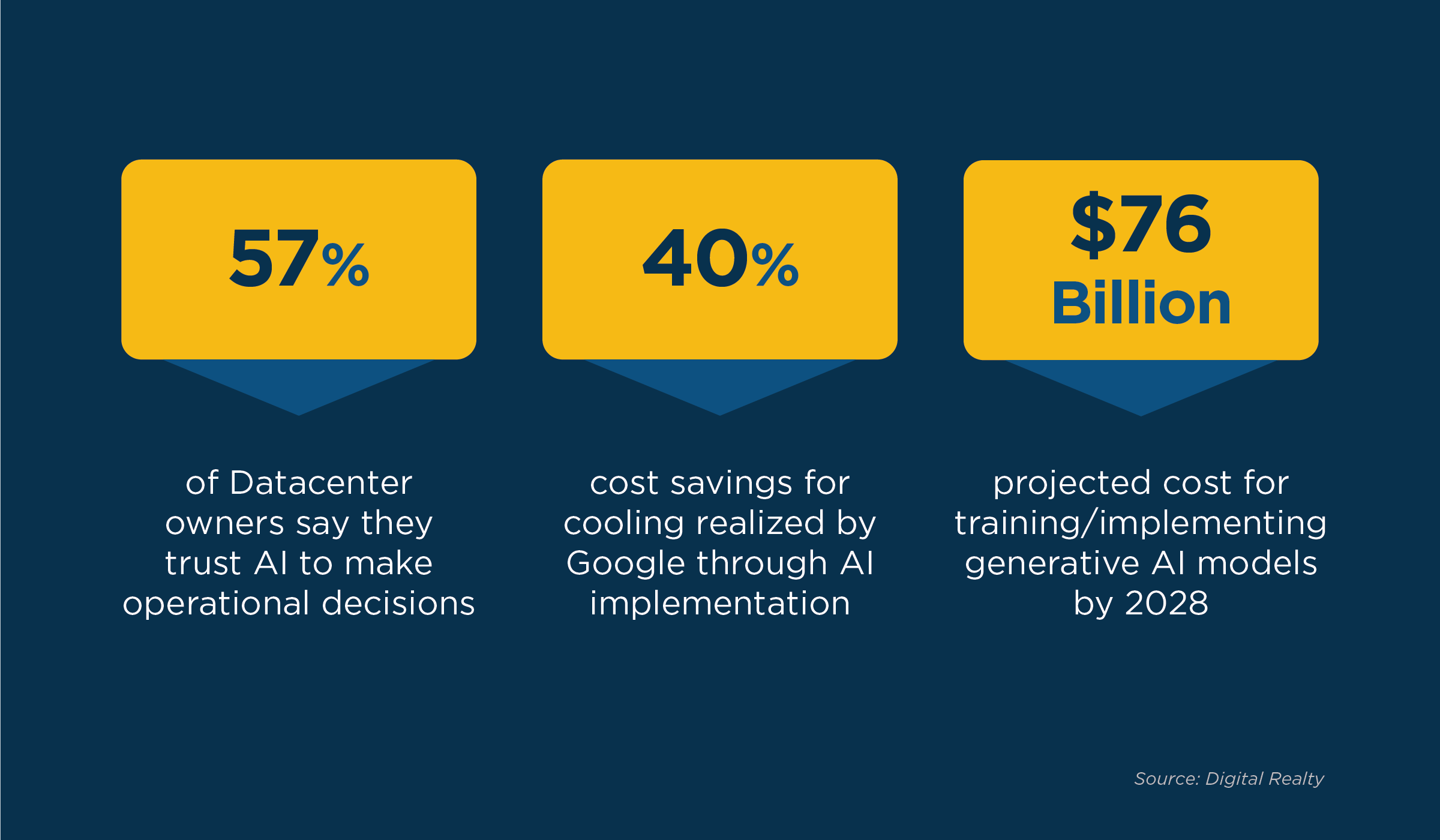Artificial Intelligence (AI) is transforming the Cloud and Datacenter landscape, bringing significant changes and enhancements in operations, management, and security. Partners can offer their customers these very real and impactful benefits. Here are just some of the key ways that AI is impacting Cloud computing functionality and Datacenter operations:
- Data Analytics | AI can analyze large datasets stored in the Cloud to forecast trends and see patterns, allowing businesses to make informed decisions and optimize operations.
- Business Intelligence (BI) | AI Cloud computing gathers and processes market, target audience, and competitor data in real-time for instant insights and informed decision-making.
- Predictive Maintenance | AI-powered predictive maintenance lets Datacenters anticipate and prevent equipment failures, reducing downtime and improving overall efficiency.
- Dynamic Workload Management | AI re-envisions workload management, optimizing resource allocation to ensure Datacenters can handle increased demands while reducing costs.
- Improved Security | AI-powered Cybersecurity solutions detect and respond to threats in real-time, providing enhanced protection for data and applications.
- Increased Efficiency | AI automates routine tasks, freeing up human resources to focus on higher-value activities which improves overall efficiency, particularly in a Datacenter.
- Cost Savings | Optimizing Datacenters with AI leads to significant cost savings, as well as reduced energy consumption and extended equipment lifespan.

Challenges and Opportunities
Taking a step forward often requires a cautious step back, or pause, before you leap forward. With everything AI delivers, it also poses challenges. Luckily, challenges are something that technology is adept at meeting. Here’s what you need to know for your customers:
- Faster Time-to-Market | AI and Cloud computing enable organizations to quickly develop and deploy new applications and services, offering a competitive edge in the market.
- Optimize Resource Allocations | From staffing to power requirements, AI can improve resource allocation by predicting and adjusting usage based on demand, resulting in cost reduction and enhanced performance.
- Datacenter Infrastructure | AI demands high-power density environments, which puts a strain on legacy Datacenter infrastructure which may require significant upgrades. Providers are aware of the issue, with next-gen locations being established (or retrofitted) to meet current and future demand.
- Cybersecurity | Using AI to transform and empower Cloud and Datacenters presents several security challenges that organizations need to address to ensure the integrity, confidentiality, and availability of data and resources. These include Data Privacy and Confidentiality, Data Integrity and Trust, Access Control and Identity Management, Compliance and Legal Issues, Security of AI Algorithms and Infrastructure Security.
- Network Requirements | The growth of AI applications and development is already intensifying Network requirements. This will continue to grow, placing added stress on Datacenters to ensure robust Connectivity, low latency, and reliable Cybersecurity.
- Ethical Considerations | AI raises ethical concerns, such as bias and transparency, which must be addressed to ensure responsible AI development and deployment. This is an important consideration, that is generating conversations around the results that are produced and the legality (copyright) of the LLM (Large Learning Model) on which the AI is trained – it’s one reason why many companies are developing their own proprietary AI models.
- New Business Models | AI empowers new business models like edge computing and Cloud-based AI services, changing the way Datacenters operate and interact with customers.
- Emerging Technologies | AI is helping develop emerging technologies, such as quantum computing and neuromorphic computing, which will further transform the Cloud, Datacenter, and IT landscape.
There’s no putting this genie back in the bottle, AI is here to stay. The way it will revolutionize the Cloud and Datacenter industry is just starting, bringing significant changes in operations, management, and Cybersecurity. As AI continues to evolve, our industry will adapt to these changes and further leverage AI to improve efficiency, reduce costs, and drive innovation.
To learn more about AI, selling into any vertical, expanding what you offer across the IT stack, and the support you can receive, the Sandler Partners Sales Engineering team hosted the “AI & the Impact to Your Customers’ Tech Approach” Tech Panel Webinar on September 10th and 11th! Over the two days we explored key areas including best approaches, benefits, and how to guide the conversation from start to conclusion. We also took a look at recent industry changes and how they’re impacting organizations you currently support and those you want to work with. On day 2 Dialpad, DYOPATH, For2Fi, and Pax8 presented their their solutions and where they work best! Missed it? Watch the recording today!
Choosing the best solution and functionality from the best supplier for your customer’s situation is where we work with you, as a member of your support team. Sandler Partners, and the Sales Engineering team, will continue to provide more information, develop resources, and be available to help you throughout your interaction with customers. We’re always ready to work with you! You can contact your Sandler Partners’ Sales Engineering team at [email protected] for immediate help, or find your complete support team – including Channel Manager, Channel leader, and dedicated regional Sales Engineer on the homepage dashboard of your Sandler Portal. Not a member of the independent Sandler Partners community? There’s never been a better time to Become a Sandler Partner, we’re ready to welcome you, and introduce you to all the benefits you have to gain!
Thanks for reading!
Author:
David Povlick
David Povlick is Sandler Partners’ Senior Sales Engineer for the Midwest, with a strong UC, Telecommunications, virtualization, and Cybersecurity background. David has a talent for delivering the highly effective solutions customers ask for and identifying any additional technology opportunities your customers’ organizations may need now and into the future to help them be successful and meet their own growth goals.
